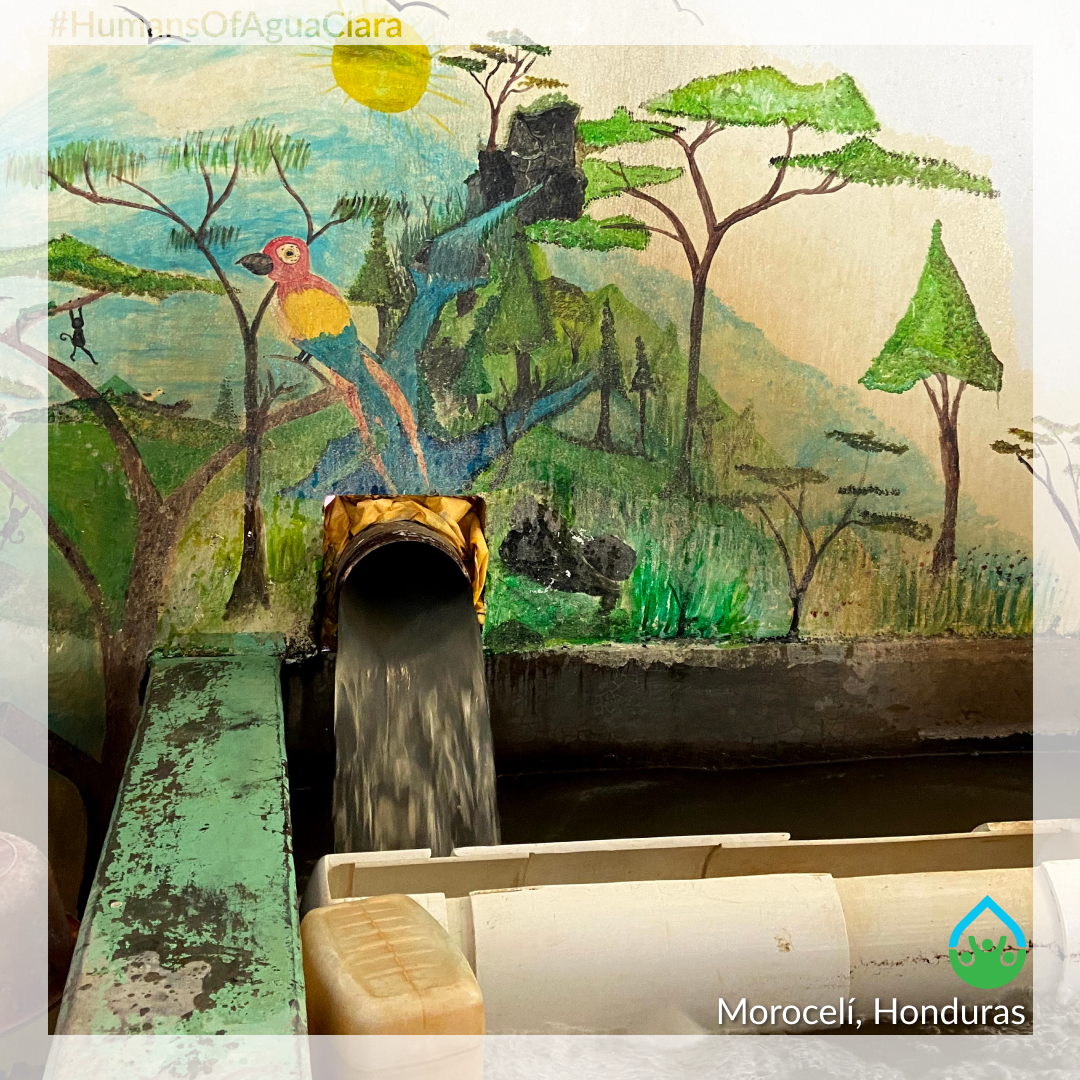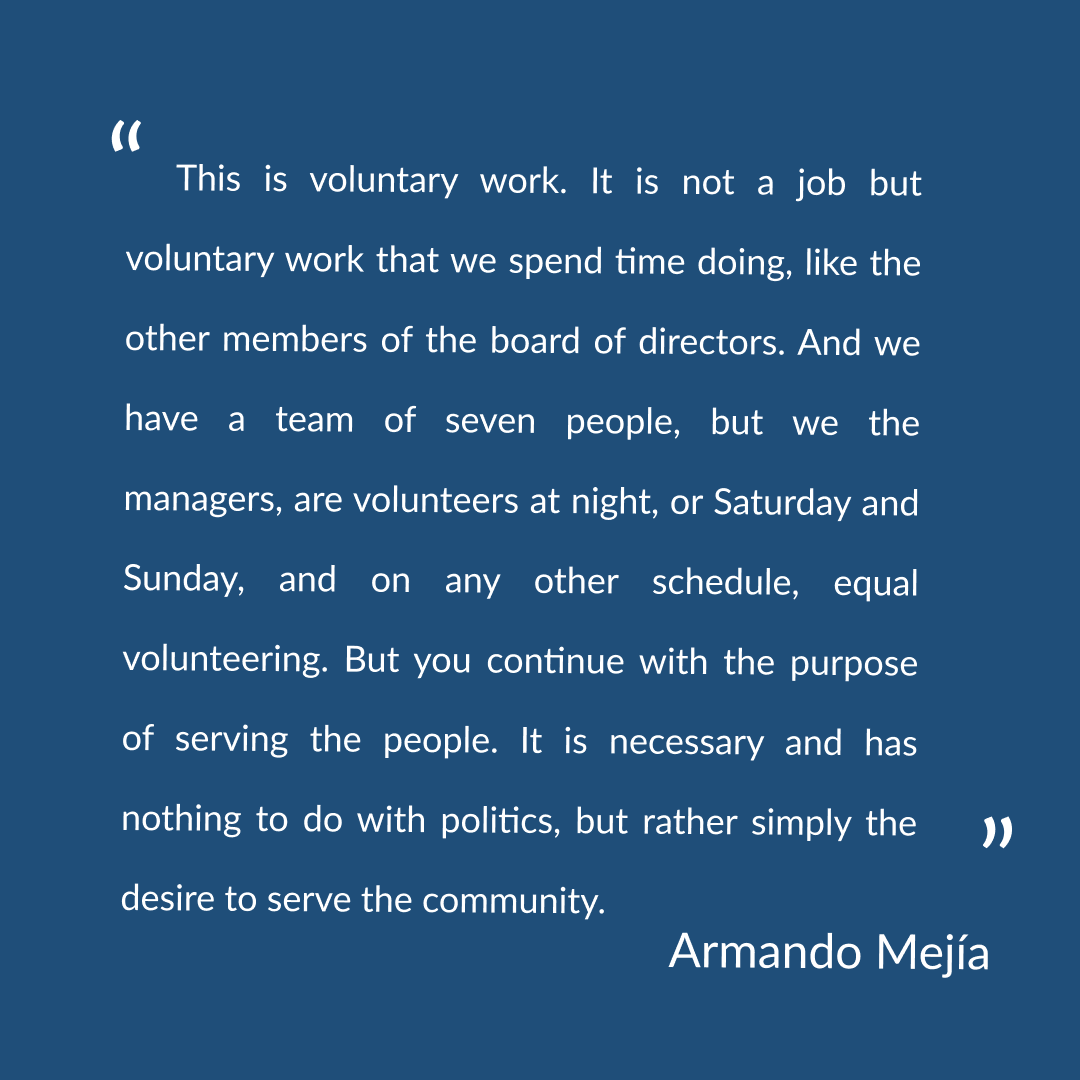Armando Mejía is the head of the water board in Morocelí, Honduras. With the position being voluntary and unpaid, he is motivated by a sense of community rather than money.
The original interview with Armando, which was conducted by AguaClara Cornell students in January 2020, is posted below. The English translation follows.
Español:
¿Cómo se llama?
Mi nombre es Armando Mejía.
¿Cuántos años ha trabajado como presidente en la junta de agua?
Bueno, ahora el ocho de enero estamos ocho… siete meses de estar al frente de la junta de agua en Morocelí.
¿De donde es originalmente?
De originario de Tegucigalpa y residente siempre quedamos en Morocelí.
¿Tuvo una experiencias relacionadas a la calidad de agua o la contaminación durante la juventud?
Sí, toda mi carrera profesional, soy ingeniero agrícola, y he trabajado fuertemente en el área de riesgos y una porción un poco en el tema de agua potable en algunas comunidades de la zona occidental del país.
¿Tuvo una planta para mejorar la calidad del agua en su juventud o no?
No, no, en ese sentido no… no plantas completas como ésta que nos implemente, y los que están…con pequeño floculador. Nada más.
¿Tenía turbidez?
Sí, sí, así, a análisis de turbidez, pero no era el tanto el tratamiento como el que se hace aquí, porque esta experiencia, para a mi en [y?] el personal, ha sido nueva. Esta planta de tratamiento que tenemos en Morocelí.
¿Por qué y cómo empezó trabajar bajó en la junta del agua?
Participando en las asambleas, fui tener alguna apertura apoyando las juntas anteriores, y luego algún grupo se le ocurrió proponerme como presidente de la asamblea. Última que detuvimos a mitad de 2009, salió electo como presidente.
¿Por qué escogió este trabajo?
No pues, sí, es un voluntariado. Nosotros en.. no es un trabajo propiamente sino que es un voluntariado al que dedicamos tiempo como los demás miembros de la junta directiva. Y tenemos un equipo de trabajo de siete personas, pero nosotros directivos, es un voluntariado de días, de la noche, o sábado y domingo, y en cualquier otro horario, igual voluntariado. Pero sigues con el propósito de servir al pueblo de una trinchera necesaria y no tiene que ver nada con la política sino que simplemente el deseo de servir a la comunidad.
¿Fue elegido por la comunidad?
Sí, fui electo en la asamblea de usuarios del sistema de agua potable y allí no se eligieron a siete personas como miembro de la junta directiva.
O, hay siete personas en la junta de agua, y ¿todas las personas son voluntarios o sólo usted?
Todos los siete, directivos y los voluntarios, y además tenemos un grupo de apoyo que también activan de manera voluntaria. Sólo siete personas, bueno ocho con un vigilante que es rotatorio cada quince días y no repite, y tratamos de apoyar a personas de la tercera edad que ya no tienen tantas puertas abiertas donde conseguir un trabajo. Con el vigilante son ocho las personas que trabajan en la junta.
¿Los operadores son pagados?
Sí, los operadores son pagados. Son tres y trabajan en turnos de doce horas. Continuas de siete de la mañana a siete de la noche y sin son pagados.
¿Dónde trabaja usted para el dinero?
Bueno anteriormente, mi carrera profesional, trabajé en proyectos de USAID, el proyecto de FAO – que es una agencia de la Naciones Unidas – en proyectos del Banco Mundial, y casi todos ellos educados [?] por la Secretaría de Agricultura y Ganadería de Honduras.
¿Cuáles son sus responsabilidades en la junta del agua?
Bueno… mi responsabilidad es la coordinación general de todo el equipo de trabajo y de la junta directiva, administrar los recursos -- tanto agua, dinero -- y crear un plan de trabajo, y echar mandar para cada año.
¿Cómo es su horario cada día?
No, no hay horario. Simplemente programamos una reunión ordinaria para el primer viernes de cada mes y después es vía teléfono, vía WhatsApp. Bueno, nos reunimos para resolver esta problemática, hay que pasar a la oficina a firmar documentos que están pendientes, y… bueno, no hay horario, somos prácticamente 24/7.
¿Cuál es el futuro de esta planta, en su opinión?
Bueno, en mi opinión es que debemos, eh, estamos gestionando la ampliación de la capacidad de almacenamiento para mejorar la distribución a algunas zonas nuevas. Y el otro proyecto que tenemos es el envasado del agua; es agua de primera calidad y queremos hacer más rentable la planta.
¿Qué piensa de la tecnología de tratamiento de agua en Honduras?
Falta mucho por hacer. Son pocas las plantas de tratamiento que tenemos en Honduras. En mucha de los casos, es un sistema de conducción almacenamiento de agua y una posterior clarificación. Pero sí, está mucho, hay mucho por hacer todavía. Hay mucho por hacer.
¿Tiene fe o esperanza en el mejoramiento del tratamiento de agua en Honduras?
Sí, claro que sí, porque se están dando ejemplos como esta planta y otras comunidades. Están queriendo poner en práctica, están adquiriendo sus propios proyectos y consiguiendo donantes o instituciones que colaboran con algún porcentaje para poner en marcha sus propias plantas de tratamiento, y sí, vamos a lograr.
¿Cuáles son los cambios que ha notado como resultado del trabajo de la junta de agua aquí?
Bueno, hemos logrado que hay un mejor manejo del recurso agua, porque ha habido demasiado derroche, porque hay bastante agua. Y hemos tenido algunos controles. Otros controles que hemos tenido es en el manejo de los recursos financieros. Ya las compras y las que se hacen es a través de requisiciones. También llevamos a licitación; varios de los servicios que estamos ejecutando las compras, hacemos licitaciones o cotizaciones. Y además de eso, tenemos también como responsabilidad el manejo de los desechos sólidos del municipio.
English:
What is your name?
My name is Armando Mejía.
How many years have you worked as president of the water board?
Well, now on January 8th, I am seven months in of being at the head of the water board in Morocelí.
Where are you originally from?
Originally from Tegucigalpa.
Did you have any experiences related to water quality or pollution during youth?
Yes, throughout my career. I'm an agricultural engineer and I have worked hard in the irrigation area and a little on the issue of drinking water in some communities in the western part of the country.
Did you have a plant to improve water quality in your youth?
Not in that sense. No complete plants like this one were implemented, and those that were there were small. Nothing else.
Was there turbidity?
Yes, well, to turbidity analysis, but it was not both the treatment and the one done here, because this experience, for me and the staff, has been new. This treatment plant we have in Morocelí.
Why and how did work begin to fall into the water board?
By participating in the assemblies, I had some support from the previous board, and then some group came up to propose me as president of the assembly. Last time we stopped in the middle of 2009, he was elected as president.
Why did you choose this work?
This is voluntary work. It is not a job but voluntary work that we spend time doing, like the other members of the Board of Directors. And we have a team of seven people, but we are the managers, are the volunteers at night, or Saturday and Sunday, and on any other schedule, equal volunteering. But you continue with the purpose of serving the people. It is necessary and has nothing to do with politics, but rather simply the desire to serve the community.
Were you chosen by the community?
Yes, I was elected to the drinking water system user assembly and there seven people were elected to the board.
There are seven people on the water board, and are all people volunteering or just you?
All seven, managers and volunteers, and we also have a support group that also volunteers. Only seven people, well eight with a watchman who is rotating every fifteen days and does not repeat, and we try to support seniors who no longer have so many doors open to get a job. With the watchman there are eight people who work on the board.
Are operators paid?
Yes, operators are paid. There are three and they work in twelve-hour shifts, continuously from seven in the morning to seven in the evening.
Where do you work for money?
Well before my career, I worked on USAID projects, the FAO project – which is a UN agency – on World Bank projects. For the Ministry of Agriculture and Livestock of Honduras.
What are your responsibilities on the water board?
Well, my responsibility is the overall coordination of the entire team and the Board of Directors; managing the resources -- both water and money -- and creating a work plan to use for each year.
What is the schedule every day?
No, no schedule. We simply schedule an ordinary meeting for the first Friday of each month and then it's via phone, via WhatsApp. Well, we meet to solve certain problems like we have to go to the office to sign documents that are pending, and… well, there is no schedule, we are practically 24/7.
What is the future of this plant, in your opinion?
Well, we are managing the expansion of storage capacity to improve distribution to some new areas. And the other project we have is water packaging; it is top quality water and we want to make the plant more profitable.
What do you think of water treatment technology in Honduras?
There is a lot to do. There are few treatment plants we have in Honduras. In many cases, it is a water storage conduction system and further clarification. But yes, there's a lot, there's a lot to do yet. There is a lot to do.
Do you have faith or hope in improving water treatment in Honduras?
Yes, of course, because examples such as this plant and other communities are being given. They are wanting to implement; they are acquiring their own projects and getting donors or institutions that collaborate with some percentage to start up their own treatment plants, and yes, we are going to improve.
What are the changes you noticed as a result of the water board's work here?
Well, we have achieved better management of the water resource, because there was too much waste before but now there is enough water. And we have had some controls. Other controls we have had are in the management of financial resources. Already the purchases are done through requisitions. We also bid several of the services that we are executing. And in addition to that, we also have a responsibility for management of municipal solid waste.
Photographer: Nicole Wang
Interviewer: Irena Gao, Hannah Si
Transcriptions and Translations: Irena Gao, Hannah Si
Interviewed: January 2020
Plant Implementation Partner: Agua Para el Pueblo (APP)
Author: Melissa Louie


